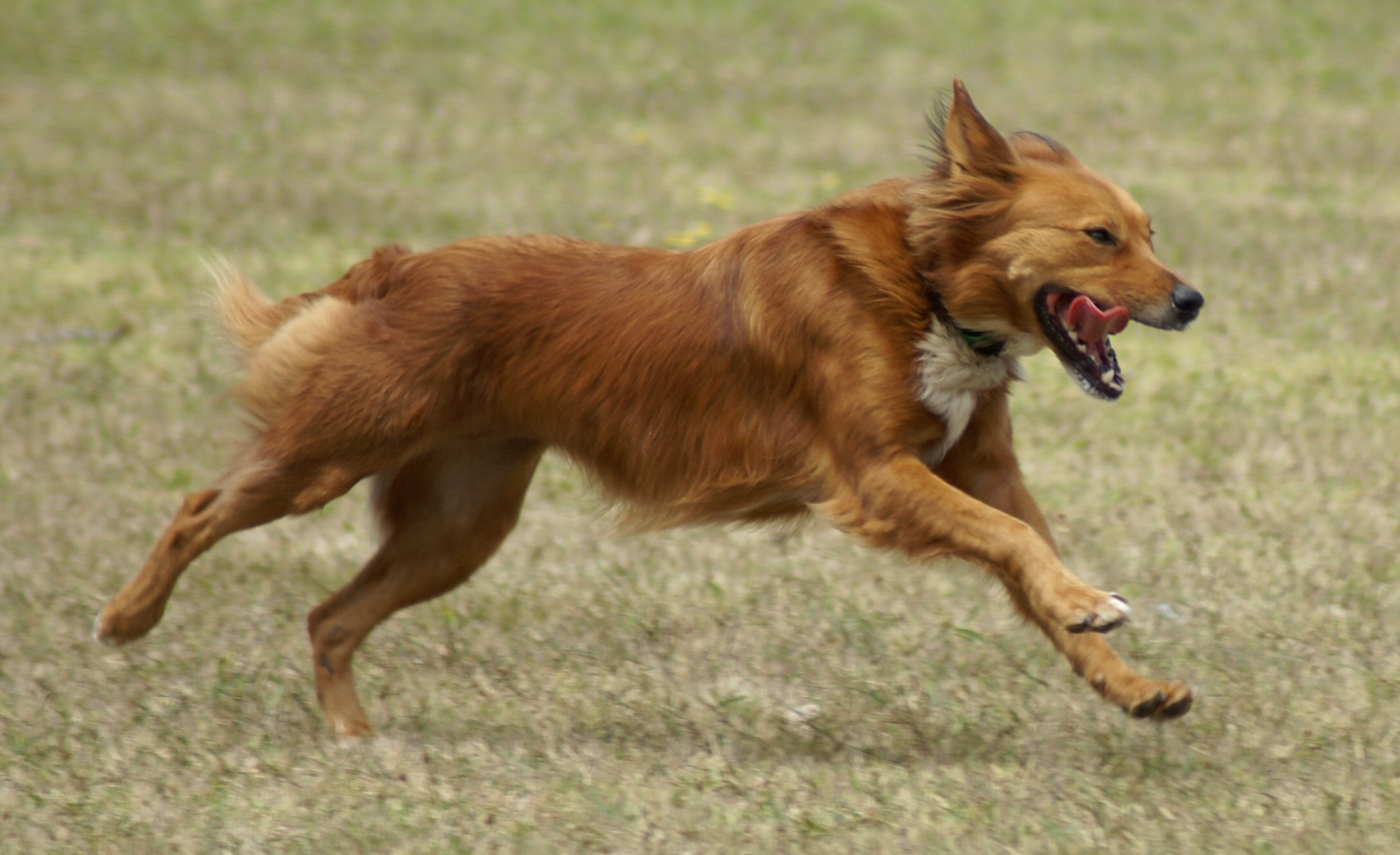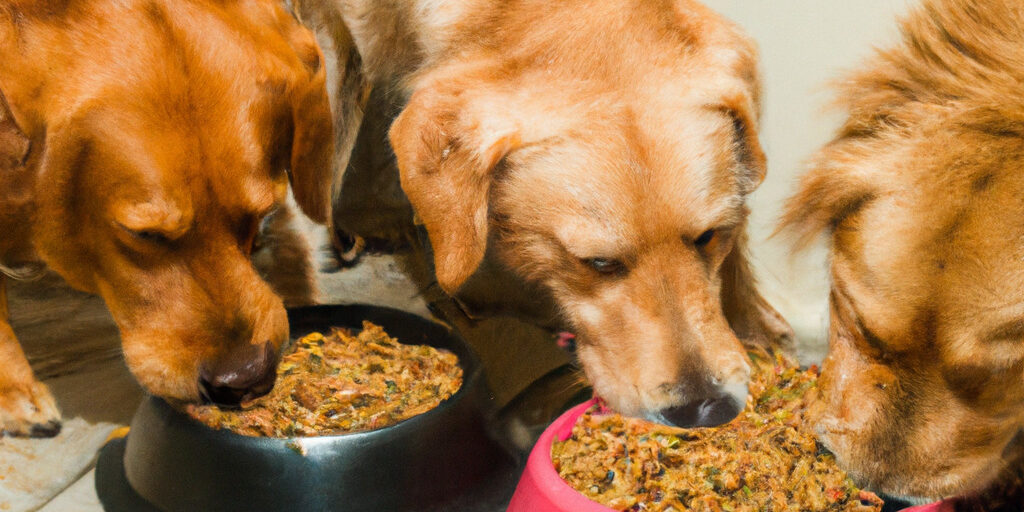Last Updated on October 30, 2023
It is very common for dogs to develop dry itchy skin. The dog’s dry skin causes the extensive scratching, and as you comb your dog’s hair, you might notice that it’s flaky too. There are plenty of reasons for the causes of dry itchy skin. While it is really easy to identify the causes of it, we would rather go straight to the remedy as it negates all of the contributing factors. Do visit the vet in the meantime to get a proper diagnosis. In this article, we will be doing a review on some of the best dog shampoo for dry itchy skin.
Best Dog Shampoo For Dry Itchy Skin
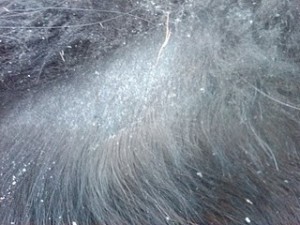 It is really not surprising that the top reason that causes dry skin in dogs is actually because owners are using low-quality shampoos. Most of the average shampoos that are available in pet stores contains chemicals that can potentially cause skin irritation to our dogs. These are some of the ingredients that you should avoid when choosing shampoo for your dog.
It is really not surprising that the top reason that causes dry skin in dogs is actually because owners are using low-quality shampoos. Most of the average shampoos that are available in pet stores contains chemicals that can potentially cause skin irritation to our dogs. These are some of the ingredients that you should avoid when choosing shampoo for your dog.
List of ingredients to avoid
Parabems * Sodium Laureth Sulfate * Sodium Laurel Sulphate* Diaminobenzene * Methylisothiazolinone * Dioxins * Stearalkonium Chloride * Artificial colors * Mineral Oil * Sodium Hydroxide.
Also, do note that it is very important we do not use human shampoos on dogs. One man’s meat is another man’s poison! It is therefore paramount that we select the best dog shampoo for dry itchy skin, and we have found one of the best brand of shampoos with tons of positive reviews online.
Earthbath carries an extensive range of products that can potentially alleviate your dog’s skin condition. The best shampoo for dry itchy skin is Earthbath’s All Natural Dog Shampoo((Oatmeal & Aloe)
Earthbath All Natural Dog Shampoo(Oatmeal & Aloe Vera)
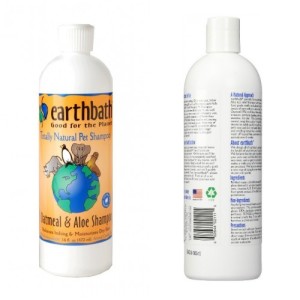 This shampoo has Oatmeal and Aloe Vera and is especially made for dry itchy skin. Colloidal Oatmeal (3%) and Aloe Vera are recommended by veterinarians to combat skin irritations, promote healing, and re-moisturize sensitive, dry skin. This best dog shampoo for dry itchy skin is natural, soap free and helps to maintain the PH level of the dog’s skin. It cleans and deodorize the skin safely and thoroughly, leaving your dog’s coat and skin brilliantly clean, soft and fluffy. It too does not wash off topical flea applications, which means the medication that you have applied for your dog is still protecting it. Safe for all dogs over 6 weeks.
This shampoo has Oatmeal and Aloe Vera and is especially made for dry itchy skin. Colloidal Oatmeal (3%) and Aloe Vera are recommended by veterinarians to combat skin irritations, promote healing, and re-moisturize sensitive, dry skin. This best dog shampoo for dry itchy skin is natural, soap free and helps to maintain the PH level of the dog’s skin. It cleans and deodorize the skin safely and thoroughly, leaving your dog’s coat and skin brilliantly clean, soft and fluffy. It too does not wash off topical flea applications, which means the medication that you have applied for your dog is still protecting it. Safe for all dogs over 6 weeks.
Noticeable results can be seen just after the first few washing with this product. You will see a dramatic drop in excessive scratching by your dog. It doesn’t have any fragrance too.
Ingredients includes purified water, colloidal oatmeal (3%), renewable plant-derived & coconut-based cleansers, aloe vera, vitamins A, B, D & E, glycerin, allantoin, food-grade extracts of vanilla & almond, natural preservative.
While not really necessary, it will be good to apply conditioner for your dog after rinsing off the shampoo. Earthbath too carries a conditioner made from Oatmeal & Aloe Vera too.
Earthbath’s All Natural Oatmeal and Aloe Conditioner
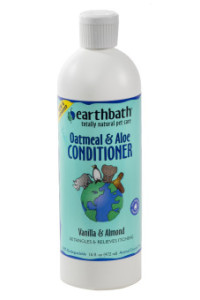 It actually comes as a surprise when we understand that many dog owners do not use conditioners on dogs. Maybe it is because the owners themselves do not use this product, and hence they don’t see the need for their dog.
It actually comes as a surprise when we understand that many dog owners do not use conditioners on dogs. Maybe it is because the owners themselves do not use this product, and hence they don’t see the need for their dog.
Conditioners are not only used to smoothen the dog’s coat. It has really practical uses too. In for example, they help to prevent residue that can enter the dog’s skin. Think of it as a sealant, whereby the coat’s moisture and oil gets retained. The dog’s coat is also subject to the usual wear and tear, so conditioners step in to help restore the coat to its smoother state.
Earthbath’s All Natural Oatmeal and Aloe Conditioner can help in untangling the dog’s coat, and at the same time reinstates the dog’s original coat. If your dog has dry and itchy skin, this will be an added boost to you as the addition of oatmeal helps to moisturize the skin too.
Critter Concepts All Natural Dog Shampoo for Allergies, Dry, Itchy and Sensitive Skin
This Critter Concepts All Natural Dog Shampoo for Allergies, Dry, Itchy and Sensitive Skin is again a top dog shampoo for dry skin. Indeed if your dog is constantly scratching herself, then this dog shampoo for dry itchy skin is awesome for them.
First of all, in terms of positive reviews on Amazon, it received 400 plus positive reviews from happy and satisfied owners of dogs with the dry skin. However, we of course did not choose this simply based on the amount of reviews. What is more important is the materials, right?
Hence, in terms of materials, you will be glad to know that it uses Tea Tree Oil, Shea Butter and Sunflower oil, which is essentially Vitamin E. Tea Tree Oil is an essential oil that is extracted from Tea Tree, which originates from Australia. It is then distilled down. One of its best properties of the Tea Tree oil is that it has antibiotic capabilities that help to destroy bacteria and fungus. Also, the natural scent helps to repel insects, hence it will be extremely useful in combating your dog’s dry itchy skin. The Shea Butter helps to protect your dog from the UV rays as well as having the medicinal properties to treat skin wounds, insect bites and also to help soothe allergies. The Vitamin E helps to keep the skin moisturized as well as assisting in the scar healing progress.
This awesome Dog Shampoo For Dry Skin also has Allantoin, Panthenol, and the D-Limonene oil. All of these are completely natural, and they help to repair a wound, moisturize the skin as well as ensuring a smooth and shiny coat!
Why Is My Dog Scratching So Much
It is commonplace for dogs to scratch. For most dog owners, it will be important for you to know what causes the dog to itch as it will allow you remedify it accordingly.
Here are some of the common reasons why dogs are scratching that much.
1. Flea and tick infestations
Flea and tick infestations are one of the most common causes of excessive scratching in dogs. Fleas are small, wingless insects that can cause intense itching and biting sensations on the skin. Ticks are small, blood-sucking parasites that attach themselves to the skin and can transmit diseases.
Flea infestations can occur even in well-groomed and clean dogs, as fleas can easily be brought into the home on the fur of other animals or on the clothing of people. Once inside, fleas can reproduce rapidly and can be difficult to eliminate.
Ticks, on the other hand, are commonly found in wooded or grassy areas and can be picked up by dogs during walks or hikes. They can cause severe itching and irritation, as well as being carriers of diseases such as Lyme disease.
Both flea and tick infestations can cause excessive scratching, biting and licking of the skin, hair loss, and scabs or hot spots on the skin. To prevent and treat these infestations, it is important to use flea and tick preventatives, such as topical medications or collars, regularly and as recommended by a veterinarian. It is also important to vacuum and wash bedding and upholstery frequently, to reduce the number of fleas in the home.
2. Allergies to food or environmental allergens (such as pollen or mold)
Allergies to food or environmental allergens can also cause excessive scratching in dogs. A food allergy is an abnormal immune response to a specific protein or carbohydrate in the dog’s diet. Common food allergens for dogs include chicken, beef, dairy, wheat, and soy. Symptoms of food allergies can include itchy skin, recurrent skin or ear infections, and gastrointestinal issues. To diagnose a food allergy, a veterinarian may recommend an elimination diet, where the dog is fed a limited ingredient diet or a novel protein source for several weeks to see if symptoms improve.
Environmental allergies, also known as atopy, are an allergic reaction to things in the dog’s environment, such as pollen, mold, dust mites, and grass. Symptoms of environmental allergies can include itchy skin, recurrent skin or ear infections, and sneezing. To diagnose environmental allergies, a veterinarian may recommend a blood test or intradermal skin test.
In both cases, treatment options include the use of antihistamines, steroids, and immunomodulators, as well as environmental management such as keeping the house clean and reducing exposure to allergens. It’s important to note that the symptoms of allergies can be similar to other conditions such as flea allergies, and you should bring your dog to the vet for a proper diagnosis.
3. Skin infections
Skin infections are another common cause of excessive scratching in dogs. These infections can be caused by a variety of microorganisms, including bacteria, yeast, and fungus.
Bacterial skin infections, also known as pyoderma, are caused by bacteria such as Staphylococcus and Streptococcus. They can cause red, swollen, and painful skin, as well as a foul odor. They can occur secondary to other skin conditions such as allergies or parasites.
Yeast infections, also known as Malassezia, are caused by an overgrowth of yeast that is normally found on the skin. They can cause red, itchy, and greasy skin, as well as a musty odor. They are often seen in dogs with allergies or other underlying skin conditions.
Fungal skin infections, such as ringworm, are caused by a fungus that can infect the skin, hair, and nails. They can cause hair loss, scaly skin, and round, itchy lesions. Ringworm is highly contagious, and can easily spread to other animals and humans.
Treatment of skin infections typically involves antibiotics or antifungals, medicated shampoos, and topical ointments. It’s important to note that underlying conditions such as allergies, hormonal imbalances, or immune disorders that can predispose a dog to skin infections, should be treated as well.
4. Hormonal imbalances (such as hypothyroidism)
Hypothyroidism is a condition caused by an underactive thyroid gland, which is responsible for producing hormones that regulate the body’s metabolism. Symptoms of hypothyroidism can include fatigue, weight gain, hair loss, and dry, itchy skin. In dogs, hypothyroidism is more common in middle-aged to older dogs, and in certain breeds such as Golden Retrievers and Doberman Pinschers.
Diagnosis of hypothyroidism typically involves blood tests to measure the levels of thyroid hormones in the body. Treatment typically involves daily oral medication, which replace the missing thyroid hormone and help regulate the metabolism.
It’s important to note that other conditions such as Cushing’s disease, which is an overproduction of cortisol from the adrenal gland, can also cause similar symptoms and it is important to consult with a veterinarian to make a proper diagnosis and recommend the most appropriate treatment.
5. Dry skin
Dry skin, also known as xerosis, can also cause excessive scratching in dogs. Dry skin occurs when the skin loses its natural oils and moisture, leading to itching, flaking, and redness.
There are several causes of dry skin in dogs, including:
- Lack of essential fatty acids in the diet
- Bathing too frequently or using harsh shampoos
- Exposure to cold or dry weather
- Underlying medical conditions such as hypothyroidism, Cushing’s disease or diabetes
- Certain medications that can cause dry skin as a side effect.
Treatment for dry skin typically involves addressing the underlying cause and providing some form of skin hydration. This can include:
- Supplementing the diet with fatty acids
- Using a mild, moisturizing shampoo
- Providing a humidifier in the dog’s living area
- Applying a moisturizing ointment or oil
- Treating underlying medical conditions
6. Psychological stress
Do you know that dogs, that are highly stresed, will also start to scratch themselves silly? The stress can manifest in them in many ways, including behavior changes, changes in appetite and sleep patterns, and changes in grooming habits.
There are many causes of psychological stress in dogs, such as:
- Changes in the home environment, such as the addition of a new pet or family member
- Lack of socialization or changes in socialization patterns
- Separation anxiety or fear of abandonment
- Lack of physical or mental stimulation
- Trauma or abuse
7. Anal glands issues
Not many dog owners will know this, that anal glands issues can also cause excessive scratching in dogs. Anal glands, also called anal sacs, are two small glands located on either side of the anus that produce a strong-smelling secretion used for marking territory and communication.
Problems with the anal glands can occur when the glands become clogged or infected, leading to discomfort and excessive licking or biting at the anus. Some of the common causes of anal gland problems include obstruction of the ducts leading to the gland, bacterial infection, inflammation of the glands, or even impacted or abscessed glands. Symptoms of anal gland problems can include scooting, licking or biting at the anus, and a bad smell coming from the dog’s anus.
8. External parasites such as mites
External parasites such as mites can also cause excessive scratching in dogs. Mites are tiny parasitic insects that can live on the skin, ears, and hair follicles of dogs. There are several types of mites that can affect dogs, including:
- Sarcoptic mange mites, which burrow into the skin and cause intense itching and redness
- Ear mites, which live in the ears and cause itching, redness, and discharge
- Demodectic mange mites, which live in the hair follicles and can cause hair loss and scaly skin
- Notoedres mites, which are found on the face and ears, and can cause itching, redness, and hair loss.
Symptoms of mite infestations can include intense itching, redness, and biting at the skin, hair loss, and scabs or hot spots on the skin. Treatment for mite infestations typically involves the use of medicated shampoos, topical ointments, and oral medications. The specific treatment will depend on the type of mite involved and the severity of the infestation.
What ingredients should I look for in a shampoo for dogs with dry itchy skin?
When looking for a shampoo for dogs with dry itchy skin, you should look for ingredients that are soothing, moisturizing, and anti-inflammatory. Here are some specific ingredients to look for:
Colloidal oatmeal
Colloidal oatmeal is a finely ground powder made from oats. It has been used for centuries to soothe and moisturize the skin. Colloidal oatmeal is particularly beneficial for dogs with dry itchy skin because it is:
- Anti-inflammatory: Colloidal oatmeal contains avenanthramides, which are compounds with powerful anti-inflammatory properties. These compounds can help to reduce inflammation and itching in the skin.
- Moisturizing: Colloidal oatmeal helps to moisturize the skin by forming a protective barrier on the surface of the skin. This barrier helps to prevent the skin from losing moisture, which can lead to dryness and itchiness.
- Hypoallergenic: Colloidal oatmeal is a non-irritating ingredient that is safe for dogs with sensitive skin.
Aloe vera
Aloe vera is a succulent plant that is native to Africa and Asia. It has been used for centuries to treat a variety of skin conditions, including burns, wounds, and eczema. Aloe vera is also beneficial for dogs with dry itchy skin because it is:
- Anti-inflammatory: Aloe vera contains compounds called acemannans, which have anti-inflammatory and wound-healing properties. These compounds can help to reduce inflammation and itching in the skin, and promote wound healing.
- Moisturizing: Aloe vera contains a high percentage of water, which helps to moisturize the skin. It also contains polysaccharides, which help to form a protective barrier on the surface of the skin to prevent moisture loss.
- Cooling: Aloe vera gel has a cooling effect on the skin. This can be helpful for dogs with dry itchy skin, as it can provide relief from itching and inflammation.
Coconut oil
Coconut oil is a natural oil that is extracted from the coconut palm. It has a wide range of health benefits, including moisturizing the skin. Coconut oil is beneficial for dogs with dry itchy skin because it is:
- Moisturizing: Coconut oil is a rich source of fatty acids, which help to hydrate and moisturize the skin. It also contains vitamin E, which is an antioxidant that can help to protect the skin from damage.
- Antibacterial and antifungal: Coconut oil has antibacterial and antifungal properties, which can help to prevent infections in the skin.
- Soothing: Coconut oil has a soothing effect on the skin. This can be helpful for dogs with dry itchy skin, as it can provide relief from itching and inflammation.
Honey
Honey is a natural sweetener that is produced by bees. It has a wide range of health benefits, including antibacterial, antifungal, and anti-inflammatory properties. Honey is beneficial for dogs with dry itchy skin because it is:
- Antibacterial and antifungal: Honey can help to prevent infections in the skin caused by bacteria and fungi.
- Anti-inflammatory: Honey contains compounds called flavonoids, which have anti-inflammatory properties. These compounds can help to reduce inflammation and itching in the skin.
- Healing: Honey can help to promote wound healing. This can be beneficial for dogs with dry itchy skin, as it can help to heal any wounds or sores that are caused by scratching.
Salicylic acid
Salicylic acid is a keratolytic agent, which means that it helps to remove dead skin cells. This can be helpful for dogs with dry skin and dandruff. Salicylic acid is also effective at killing bacteria and yeast, which can be beneficial for dogs with skin infections.
When choosing a shampoo for your dog with dry itchy skin, it is important to select a product that contains one or more of the ingredients listed above. It is also important to avoid shampoos that contain harsh chemicals, such as sulfates and parabens, as these can irritate the skin. It is always best to consult with your veterinarian before using any new shampoo on your dog, especially if they have sensitive skin.
 Dog N Treats All dogs deserve to be pampered
Dog N Treats All dogs deserve to be pampered



